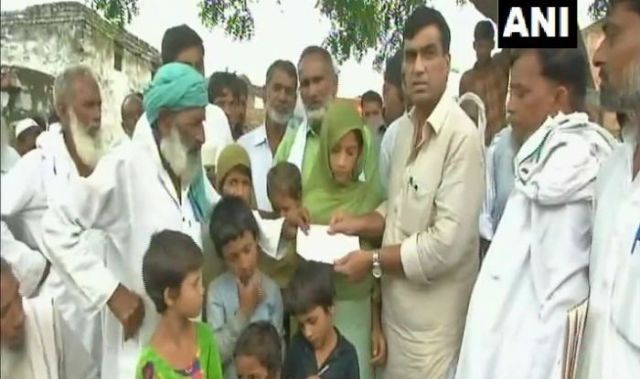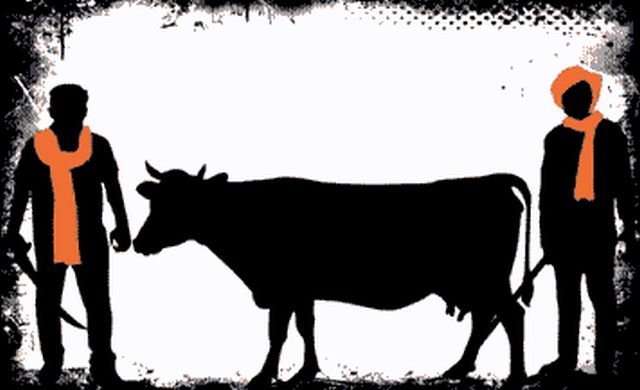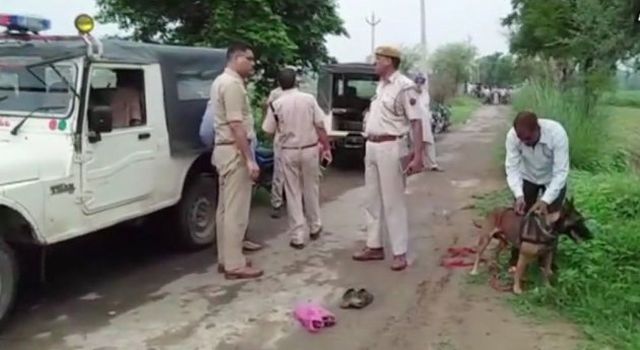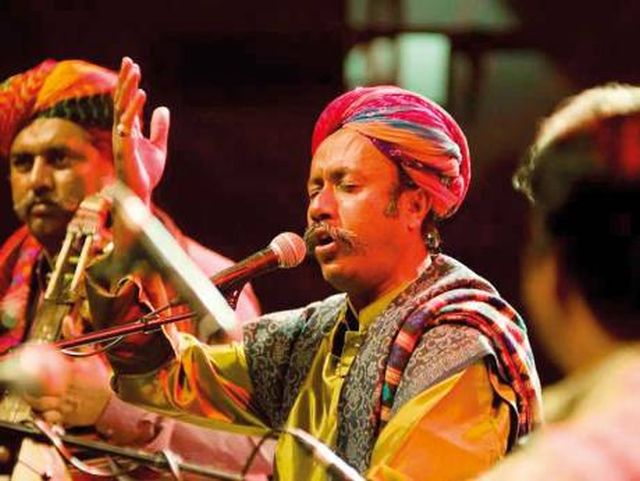
by Editor | May 25, 2021 | News, Politics

Haryana Waqf Board Chairman Raheesha Khan gives Rs 3 lakh, Haryana government gives a cheque of Rs 5 lakh to Rakbar’s family (ANI)
Chandigarh : The Haryana government on Thursday said Rakbar Khan alias Akbar from Nuh district of the state fell victim to mob lynching in Rajasthan “on mere suspicion of cow smuggling” and announced a total aid of Rs 8 lakh to the next of kin.
Rakbar was a native of Kaul village in Ferozepur Jhirka area of Haryana.
“Haryana Chief Minister Manohar Lal has announced a financial assistance of Rs 5 lakh to Rakbar’s family who was lynched in Alwar on mere suspicion of cow smuggling,” a government statement said.
It said that Haryana Waqf Board Chairman Raheesha Khan has announced assistance of Rs 3 lakh to the family.
“Thus, Rs 8 lakh in total will be provided as assistance by the government.”
Rakbar Khan is survived by his wife, four daughters and three sons.
—IANS

by Editor | May 25, 2021 | News, Politics

Representational Image (Google image)
Jaipur : Even as Rajasthan home minister Gulabchand Kataria on Tuesday promised strict action in the Alwar lynching case, his colleague and state Labour Minister Jaswant Singh asked Muslims and the Mev community to “stop consuming beef’ and “keep away from cow smugglers to respect the Hindus.”
“We will ensure punishment to the guilty,” home minister Kataria said while inspecting the site at Ramgarh (Alwar) where Rakbar alias Akabar was lynched by a mob over cow smuggling on Saturday night. Kataria was accompanied by Director General of Police OP Galhotra.
Earlier, Labour Minister Jaswant Singh, who was also in Alwar, said: “These incidents (of violence) are almost a daily occurrence,” adding that since the “root cause” is cow smuggling, “the Muslims should avoid eating beef and not support cow smugglers.”
Kataria met Chief Secretary DB Gupta, DGP Galhotra and special Director General (Law and Order) NRK Reddy to review the situation following the lynching incident. He said that a few lapses have come to the fore on police’s part and an assistant sub-inspector has been suspended. “Action has also been taken against four constables. We will take right action,” he said.
The post-mortem of Rakbar has confirmed that he died due to multiple internal injuries sustained from severe beating, sources said.
Amid a charged atmosphere in Alwar, district Shiv Sena chief Bhupendra Singh Naruka said his party supported the ‘innocents’ caught by the police and would fight their case in the court “on its expenses.” He also questioned BJP on its delay to declare cow as a “national animal” of the country.
Meanwhile BJP legislator from Ramgarh (Alwar) Gyandev Ahuja on Tuesday said that Rakbar had died in police custody and not by a mob. He also said that action taken against four policemen on Monday was to “shield” senior police officers. He also demanded a judicial probe into this matter.
The Rajasthan police late on Monday accepted “error of judgement” by its personnel which delayed the victim’s arrival to the hospital. Rakbar was declared brought dead in the hospital.
—IANS

by Editor | May 25, 2021 | News, Politics
 Alwar : A 28-year-old man has been beaten to death by suspected cow vigilantes in Rajasthans Alwar district, police said on Saturday.
Alwar : A 28-year-old man has been beaten to death by suspected cow vigilantes in Rajasthans Alwar district, police said on Saturday.
Chief Minister Vasundhara Raje condemned the Friday night incident in which some villagers caught and beat up Akbar Khan, suspecting him to be a cow smuggler.
“The incident of alleged lynching of a person transporting bovines in Alwar district is condemnable. Strictest possible action shall be taken against the perpetrators,” Raje tweeted.
Khan, a resident of Kolgaon in Haryana, was taking cows to his village along with another man when they were stopped by a group of villagers near Lalawandi village in Alwar, a police officer said.
The villagers severely thrashed Khan and his accomplice, the police officer said, adding Khan’s body has been sent for autopsy.
Alwar has earlier also witnessed attacks in the name of cow protection. The latest killing comes more than a year after Pehlu Khan was murdered allegedly by some cow vigilantes last year in April.
The central and state governments came under a sharp criticism from the Supreme Court earlier this week over frequent lynching incidents.
The Supreme Court also asked Parliament to come up with a law to tackle cow vigilantism and lynch, calling such incidents “horrendous acts of mobocracy” that should be nipped in the bud.
—IANS

by Editor | May 25, 2021 | Entrepreneurship, Events, Social Round-up
 By Archana Sharma,
By Archana Sharma,
Jaipur : They are Muslims, yet they sing Krishna “bhajans” (hymns) from Hindu lore. They have adopted a hybrid culture that is a mix of both religions and lifestyles. Many of their names too blend two religions, like Shankar Khan and Krishna Khan.
They are the Manganiyaars, who hail from western Rajasthan, where a thriving legacy of secular music has touched the hearts of music lovers not just in India but in many countries across the world where they have played. But they remain a struggling lot at home.
According to Manjoor Khan, a grandly-turbaned Manganiyaar folk singer, their art has flourished under the Rajputs. “Hindu Rajputs have kept our legacies live; they have protected us and kept our art living and thriving. For years, we have been singing for them,” Khan told IANS.
“Since centuries, our ancestors brought in a musical tradition, soaking the rhythmic waves emanating and emerging from Persia and Punjab. Over the years, our music earned fame as our melodies transcended the boundaries to win hearts of people across the world,” he added.
Western Rajasthan truly symbolises the cultural pluralism of India — what is called the Ganga-Jamuna culture — as many Muslims residing here, since their birth, have adopted the lifestyle and dress of Hindus because of centuries of cultural osmosis between the two religions.
Manganiyaars’ music blends the traditions of Hindustani and Sufi music. Many generations were connected to both Muslim and Hindu families to earn their livelihood where they sang and composed music for their “jajmaans” (patrons).
The Manganiyaars story is incomplete without mentioning Langas, their musical cousins. Langa means “song giver” and includes poets, singers, and musicians from Barmer. They too had expertise in Sufi singing and hence their patrons, unlike the Manganiyaars, were Muslims. They too performed at events such as births and weddings, exclusively for their patrons.
While the Hindu patrons of the Manganiyaars belonged to Bhati and Rathore clans of Rajputs, the Muslim patrons of the Langas were Sindhi Muslims.
The Manganiyar performers traditionally invoke the Hindu god Krishna and seek his blessings before beginning their recital while the Langas sing sufi songs.
Now, as their royal patrons exist no more, the Manganiyaars and Langas face tough times. Many of them still thrive on the mercy of their patrons’ places who are limited in numbers now.
While their community earns fame in the global arena, the Manganiyaars battle for their existence on home turf.
Bhungar Khan Manganiyaar, who now performs in countries like Australia, UK, Sweden, Norway, Germany and Russia, complains that this age-old legacy lacks the required support from the government in India and the new age generation is losing interest in this music.
There still exists a few artists, such as his stage partner Asin Langa, who teaches the rhythms of the music to kids at his home. “We need proper schools and trained teachers who can help build next-generation artists, but this seems like a distant dream,” Khan says.
Asin Langa also shares the pain. “I run a small school at my home where I teach 15 kids. In 2011, we received funds from Delhi Academy for a year which was like Rs 2,500 per kid and Rs 7,500 per teacher. That fund was received in my father’s name. However, we are still awaiting more funds. Now, as my father is no more, I have inherited the task of teaching kids, but, at times, I too feel the financial crunch,” Langa told IANS.
The duo believe that this legacy is going on due to efforts of people like them.
Manjoor Khan also runs a school with 40 kids in Barmer which receives financial support form Mumbai-based firm JSW.
“We have been receiving a helping hand from private firms, but government extends no aid to us,” he complained.
Earlier, their music was limited to the borders of western Rajasthan, but now even Bollywood seems quite influenced with their magic. Recently, two children of these communities made it to Bollywood chartbusters.
Sarvar Khan, 12, and Sartaaj Khan, 11, lent their voice to ‘Bapu sehat ke liye tu to hanikarak hai’ in Aamir Khan’s film “Dangal”. Earlier, in 2014, Swaroop Khan Manganiyar also won millions of hearts by singing ‘Tharki chokro’ in the film “PK”.
The credit for getting their music some national and international attention goes to Komal Kothari, who brought the traditional musicians before a larger, even global, audience. Previously, they preferred surviving on the patronage of wealthy merchants in caravan towns. As their patrons’ fortunes waned, so did theirs, before Kothari came along.
Also known as Komalda, he was the first to record the Manganiyars for a radio programme. Awarded Padma Shri and Padma Vibhushan for his exceptional work in the field of music, he was an Indian folklorist and ethno-musicologist from Jodhpur.
In 1960, he met Antar Khan, a Manganiyar, on the street, and soon he took him to his office. As he was preparing his vintage tape recorder to record him, he saw him disappear. When chased and caught, the poor man said that he feared his voice might be swallowed by a recording machine if he sang in front of it.
Kothari started making quick trips to Jaisalmer, in Manganiyar country, to talk to them on earning a new livelihood.
In 1962, the first recording of Langa music took place. In 1963, a Manganiyar troupe performed in Delhi, for the first time on stage. But Kothari wanted to showcase them to world.
In 1967, he traveled to Sweden with Langa troupe for their maiden performance outside India. Soon the Indian Council of Cultural Research (ICCR) got into the act. By the time India staged the popular Festivals of India all over the world in the mid-eighties, Manganiyars and Langas had become the darlings of international audiences.
Today, Rajasthan’s tourism industry is driven quite substantially by these charismatic performers. But they fear that without institutionalised support, their tradition may just die out.
(The weekly feature series is part of a positive-journalism project of IANS and the Frank Islam Foundation. Archana Sharma can be contacted at archana.s@ians.in)
—IANS

by Editor | May 25, 2021 | Interviews

Sachin Pilot
By Prashant Sood and Sidhartha Dutta,
New Delhi : From a historical low in 2013, the Congress has bounced back in Rajasthan with support from all communities and will oust the BJP in the assembly polls later this year, says state Congress chief Sachin Pilot, who also feels that the BJP is finding it difficult to find a state unit chief as no one wants to be a scapegoat after the assembly elections later this year.
Pilot, 40, says that caste is not the pivot around which everything works in an election and young people were now looking beyond caste while voting.
Pilot said it had been almost four weeks since the state BJP president Ashok Parnami “was made to resign”.
“And for four weeks they have not found a person to do the job because nobody wants to be a scapegoat. They know in 5-6 months, they will lose the election. For four weeks, the BJP, the party with a difference and so-called largest party in the world, is unable to find somebody who is willing to do the job of a state president. This shows the reality of the government of Rajasthan and BJP itself,” Pilot told IANS in an interview.
Taking a dig at Chief Minister Vasundhara Raje, he said she had visited the national capital not to seek development funds “but to lobby for (appointment of) a state president.
“So there is obvious infighting (in BJP). There is a lack of coordination between the state and central governments, and people are suffering because of that,” he said.
Pilot said Raje has lost control over governance and there is “unemployment, agrarian distress, farmers’ suicides, atrocities against tribals and Dalits and scams relating to land and mining”.
Asked about former Chief Minister Ashok Gehlot’s remarks, apparently aimed at him, that younger leaders should stay in the queue and those who break the line risked a premature end to their political career, Pilot referred to Congress President Rahul Gandhi’s speech at the party’s plenary in March where he had talked of breaking down walls.
“I don’t think Gehlotji was trying to attack anybody. But I do remember that speech Mr Rahul Gandhi made, where he committed himself to breaking down the walls in politics and in the Congress party. So, when the Congress president is breaking down the walls, where is the question of any line and queues?” he asked.
Asked about Gehlot’s other remark that a PCC chief should not be automatically considered as chief ministerial choice, Pilot said the party has been fighting elections under the leadership of Rahul Gandhi and will do so in Rajasthan also.
“The aim and objective for all of us is to secure a mandate for the Congress and who will get what position is not a matter of concern for me or others. We are fighting as a team,” he said.
Asked about Gehlot’s appointment as a party general secretary and his remarks that he had not been separated from Rajasthan politics, Pilot said: “Even if Ashok Gehlotji wants himself to be away from Rajasthan, as party president I won’t allow him to be away from Rajasthan.”
On ticket distribution, Pilot, who was appointed state Congress chief after the party’s debacle in the 2013 assembly polls, said winnability and consensus will be the criteria and “people who have worked in the last four years to rebuild the party, their efforts will be rewarded”.
“We are focusing on booths. The fake voters that the BJP had included, we are taking them out. And we are taking the battle to the polling stations. At the right time we will declare the candidates,” he said.
Asked about the reasons for the party’s debacle in the assembly polls, he said a factor was the party not being able to translate the good work done into political dividends.
“It requires some sort of communication strategy, some sort of self-marketing, which perhaps we didn’t do well. But we lost (due) to many other reasons.”
Pilot noted that he was a MP at 26, a Union minister at 31 and made chief of the Rajasthan Congress at 35. “The party has given me so much; now it’s time for me to give back to the party,” he said.
On a query on the caste matrix, he said: “As far as caste communities are concerned, they will vote on issues and the Congress is the only party that has the capacity and the intent to carry all communities together, all castes together,” he added.
The Congress had been reduced to 21 seats in the 200-seat Assembly in the 2013 elections but won four of six assembly by-polls and the two parliamentary by-elections to Ajmer and Alwar earlier this year. The party led in all the 16 segments of two parliamentary seats.
Pilot said no ruling party in Rajasthan has lost a parliamentary by-election in the last 40 years and it showed the depth of anger against BJP across all communities and regions.
(Prashant Sood can be contacted at prashant.s@ians.in and Sidhartha Dutta at sidhartha.d@ians.in)
—IANS






